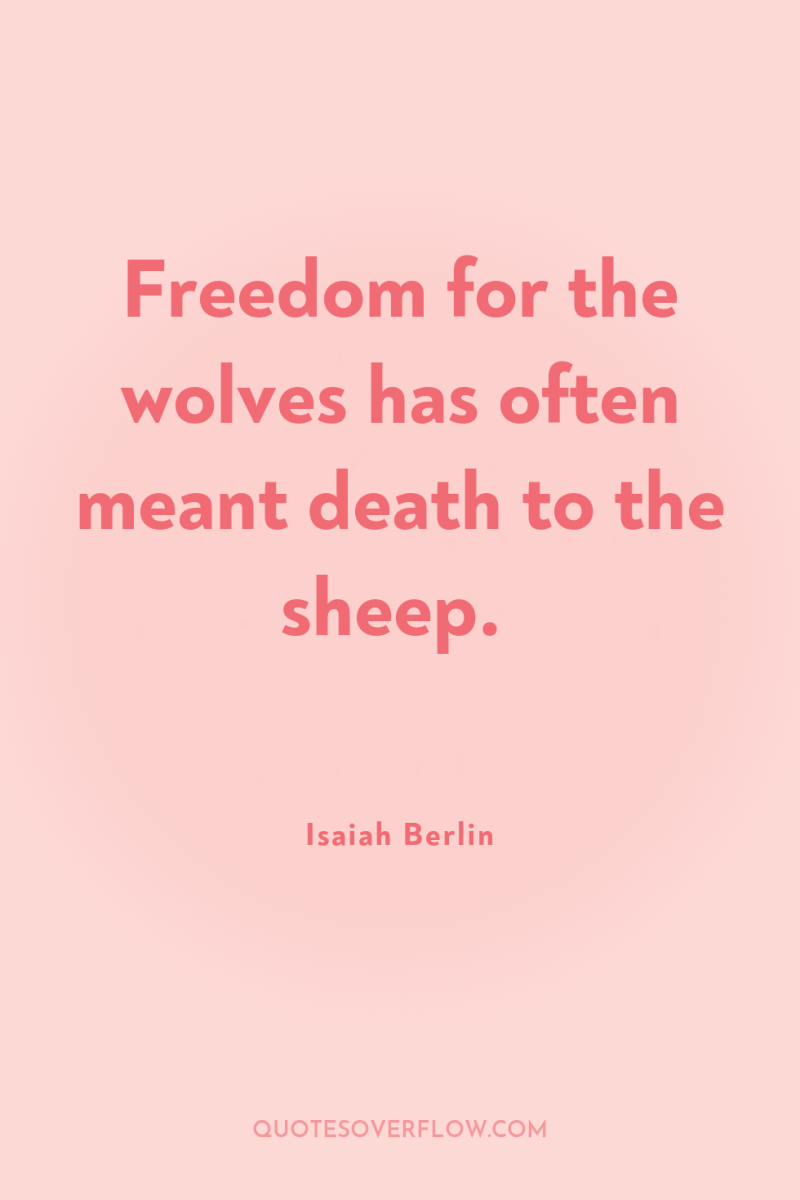1
Men would no longer be victims of nature or of their own largely irrational societies: reason would triumph; universal harmonious cooperation, true history, would at last begin. For if this was not so, do the ideas of progress, of history, have any meaning? Is there not a movement, however tortuous, from ignorance to knowledge, from mythical thought and childish fantasies to perception of reality face to face, to knowledge of true goals, true values as well as truths of fact? Can history be a mere purposeless succession of events, caused by a mixture of material factors and the play of random selection, a tale full of sound and fury signifying nothing? This was unthinkable. The day would dawn when men and women would take their lives in their own hands and not be self-seeking beings or the playthings of blind forces that they did not understand. It was, at the very least, not impossible to conceive that such an earthly paradise could be; and if conceivable we could, at any rate, try to march towards it. That has been at the centre of ethical thought from the Greeks to the Christian visionaries of the Middle Ages, from the Renaissance to progressive thought in the last century; and indeed, is believed by many to this day.Isaiah Berlin
2
The view that the truth is one and undivided, and the same for all men everywhere at all times, whether one finds it in the pronouncements of sacred books, traditional wisdom, the authority of churches, democratic majorities, observation and experiment conducted by qualified experts, or the convictions of simple folks uncorrupted by civilisation---this view, in one form or another, is central to western thought, which stems from Plato and his disciples.Isaiah Berlin

3
The fox knows many things, but the hedgehog knows one big thing.Isaiah Berlin

4
Freedom for the wolves has often meant death to the sheep.Isaiah Berlin
5
Tolstoy was perfectly right to protest that history is not made to happen by the combination of such obscure entities as the ‘power’ or ‘mental activity’ assumed by naïve historians; indeed he was, in Kareev’s view, at his best when he denounced the tendency of metaphysically minded writers to attribute causal efficacy to, or idealise, such abstract entities as ‘heroes’, ‘historic forces’, ‘moral forces’, ‘nationalism’, ‘reason’ and so on, whereby they simultaneously committed the two deadly sins of inventing non-existent entities to explain concrete events and of giving free reign to personal, or national, or class, or metaphysical bias.Isaiah Berlin
6
Both liberty and equality are among the primary goals pursued by human beings throughout many centuries; but total liberty for wolves is death to the lambs, total liberty of the powerful, the gifted, is not compatible with the rights to a decent existence of the weak and the less gifted.Isaiah Berlin
7
Romanticism embodied "a new and restless spirit, seeking violently to burst through old and cramping forms, a nervous preoccupation with perpetually changing inner states of consciousness, a longing for the unbounded and the indefinable, for perpetual movement and change, an effort to return to the forgotten sources of life, a passionate effort at self-assertion both individual and collective, a search after means of expressing an unappeasable yearning for unattainable goals.Isaiah Berlin
8
If you are truly convinced that there is some solution to all human problems, that one can conceive an ideal society which men can reach if only they do what is necessary to attain it, then you and your followers must believe that no price can be too high to pay in order to open the gates of such a paradise. Only the stupid and malevolent will resist once certain simple truths are put to them. Those who resist must be persuaded; if they cannot be persuaded, laws must be passed to restrain them; if that does not work, then coercion, if need be violence, will inevitably have to be used–if necessary, terror, slaughter.Isaiah Berlin
9
What is Life?(1) Tale told by an idiot full of sound and fury, signifying nothing.(2) Dictionary definition in biology (chemical process within organic entities involving metabolism etc.)(3) Mrs Woolf: ‘Life is a luminous halo, a semi-transparent envelope surrounding us from the beginning of consciousness to the end.’(4) Series of actual and hypothetical behavioural data which differ in certain assignable ways from data defining dead or inanimate entities.(5) That which the Lord infused into Adam. See Genesis 1. 4 [sc. 2. 7].Which?Mental Cramp.Isaiah Berlin
10
I can see how, with enough false education, enough widespread illusion and error, men can, while remaining men, believe this and commit the most unspeakable crimes.Isaiah Berlin
11
This, for both Schopenhauer and Tolstoy, is the central tragedy of human life; if only men would learn how little the cleverest and most gifted among them can control, how little they can know of all the multitude of factors the orderly movement of which is the history of the world; above all, what presumptuous nonsense it is to claim to perceive an order merely on the strength of believing desperately that an order must exist, when all one actually perceives is meaningless chaos —a chaos of which the heightened form, the microcosm in which the disorder of human life is reflected in an intense degree, is war.Isaiah Berlin
12
Liberty for wolves is death to the lambs.Isaiah Berlin
13
Injustice, poverty, slavery, ignorance - these may be cured by reform or revolution. But men do not live only by fighting evils. They live by positive goals, individual and collective, a vast variety of them, seldom predictable, at times incompatible.Isaiah Berlin
14
The fundamental sense of freedom is freedom from chains, from imprisonment, from enslavement by others. The rest is extension of this sense, or else metaphor.Isaiah Berlin